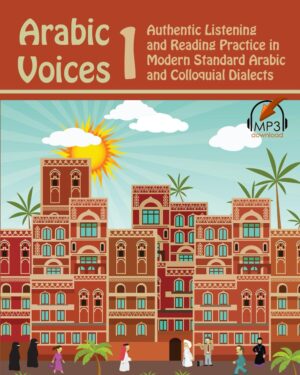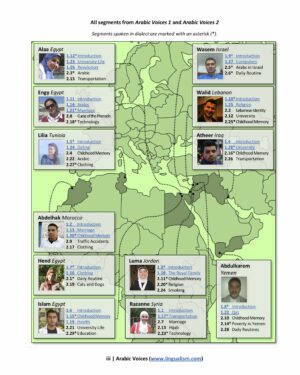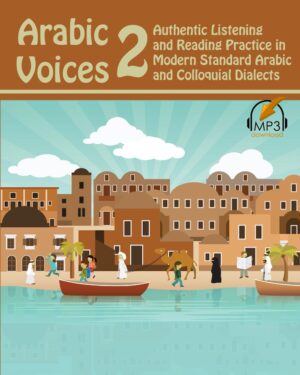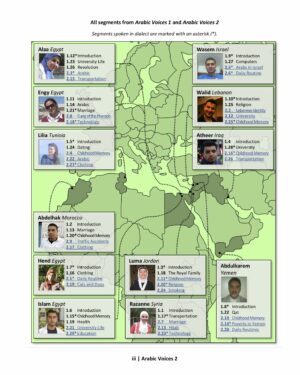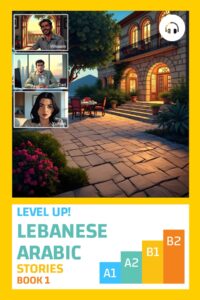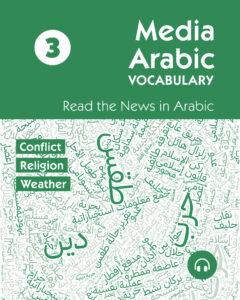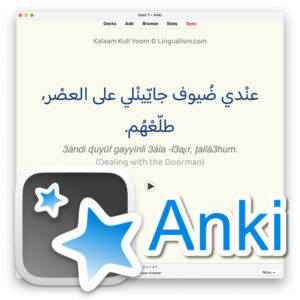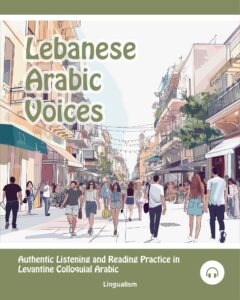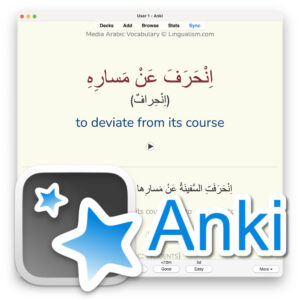Home » Modern Standard Arabic » Transportation–Alaa
Transportation–Alaa
| Greetings and welcome! [00:00.2] | السلام عليكم ورحمة الله وبركاته، أهلًا ومرحبًا بكم. | |
| Today, we will talk about what Alaa has said about transportation in Egypt, and we will comment on the different words she used. [00:04.4] | اليوم سنتحدّث عمّا قالته آلاء بشأن المواصلات في مصر، وسنقوم بالتعليق على ما استخدمته من كلماتٍ مختلفة. | |
| We start on page 84, specifically on line 4, where Alaa says, "But the most famous, oldest and most ancient is the tram." [00:14.0] | ونبدأ في الصفحة الرابعة والثمانون، وتحديدًا في السطر الرابع، حيث تقول آلاء: (ولكن أشهرها وأقدمها وأكثرها عراقة هو الترام). | |
| And the word عراقة means أصالة (originality), and we often use it… We often use it to refer to a place or something, that has an ancient history and has authenticity. [00:26.6] | وكلمة [عراقة] تعني [أصالة]، وغالبًا ما نستخدمها ا… وغالبًا ما نستخدمها للإشارة إلى مكانٍ أو شيءٍ ما، له تاريخ قديم وبه أصالة. | |
| We say, for example, "Egypt is ancient," that is, it has a long history, and that it is… that it has originality. "This place is ancient," that is, it has a long history, an ancient history, and has originality. The… 'of antiquity.' [00:42.4] | نقول مثلًا أن (مصر هي ذات عراقة)، أي أن لها تاريخ طويل، وأنها… أن بها أصالة؛ (هذا المكان ذا عراقة)، أي له تاريخ طويل، تاريخ قديم، وله أصالة؛ ذا… [ذات عراقة] أو [ذا عراقة]. | |
| After that, on line 6, Alaa says, "Because it is divided into a family cart, a men’s car, and a women’s car." [01:04.2] | بعد ذلك في السطر السادس تقول آلاء: (لأنها تنقسم إلى عربة عائلات، وعربة رجال، وعربة سيدات). | |
| Here, a word or verb ينقسم (is split) is used, and when the verb is used… the verb is used with the word إلى (to)... or the preposition إلى. [01:13.4] | وهنا تستخدم آلاء كلمة أو فعل [ينقسم]، وعند استخدام الفعل… الفعل [ينقسم] تستخدم معه كلمة [إلى]... أو حرف الجر [إلى]. | |
| This place is divided into three parts; this book is divided into three parts," and so on; ينقسم إلى [01:26.5] | (هذا المكان ينقسم إلى ثلاثة أجزاء، هذا الكتاب ينقسم إلى ثلاثة أقسام)، وهكذا؛ [ينقسم إلى]. | |
| Then we move to line 7, where Alaa says, "For example, when I was young, I used to ride the tram at first." [01:38.4] | بعد ذلك ننتقل إلى السطر السابع، حيث تقول آلاء: (فمثلًا عندما كنت صغيرة، كنت أركب الترام في البداية). | |
| Here we would like to refer to a grammatical form that we use when referring to a verb that we did in the past and no longer do now. [01:49.1] | وهنا نودّ الإشارة إلى صيغة نحوية نستخدمها عند الإشارة إلى فعلٍ كنا نفعله في الماضي ولم نعد نفعله الآن. | |
| For example, she says, "When I was young, I used to ride the tram." Here, she uses the verb “was” and after the verb, you use the present tense. [02:03.2] | فمثلًا تقول: (عندما كنت صغيرة، كنت أركب الترام)، هنا تستخدم آلاء الفعل [كان]، وبعد الفعل كان تستخدم [الفعل المضارع]. | |
| When I was young, I used to ride a bike." This means that I no longer ride a bike; you can use the verb كان (was), and after the verb you use 'present tense' to refer to something you did in the past, and you no longer do. [02:17.2] | (عندما كنت صغير، كنت أركب الدراجة)، وهذا يعني أنني لم أعد أركب الدراجة، فيمكنك أن تستخدم الفعل [كان]، وبعد الفعل كان تستخدم [الفعل المضارع] لتشير إلى شيء كنت تفعله في الماضي، ولم تعد تفعله بعد. | |
| If you say, for example, that you took the tram or that you ride the tram... when you say, "I took the tram," this happened in the past; When you say "I take the tram," this happened in the present. [02:35.6] | فإذا قلت مثلًا أنك ركبت الترام أو أنك تركب الترام عندما تقول: (ركبت الترام)، هذا حدث في الماضي؛ عندما تقول (تركب الترام)، فهذا حدث في الحاضر أنت تفعله كل يوم، | |
| You do it every day, but you were riding the tram. This means that you used to do it in the past, and you don't do it anymore. [02:48.9] | ولكن كنت تركب الترام هذا يعني أنك كنت تفعله في الماضي، ولم تعد تفعله بعد. | |
| I used to play sports as a kid," which means I don't do sports now, and so on. [02:58.6] | (أنا كنت أمارس الرياضة في صغري)، وهذا يعني أنني لا أمارس الرياضة الآن، وهكذا. | |
| At the end of this sentence, Alaa also says to emphasize that this was in...happened in the past—you say 'in the beginning...in the beginning.' [03:07.1] | في نهاية هذه الجملة تقول آلاء كذلك للتأكيد على أن هذا كان في… حدث في الماضي—تقول [في البداية… في البداية] | |
| And this is a phrase you can use to refer to something you were doing in the beginning, you can say في البداية (in the beginning) or at بداية الأمر, both are correct. [03:20.7] | وهذه عبارة يمكنك استخدامها للإشارة إلى شيء كنت تفعله في بداية الأمر، يمكنك أن تقول [في البداية] أو في [بداية الأمر]، كلاهما صحيح. | |
| We can say here, for example, "When I was young I used to take the tram in the beginning" or 'in the beginning." Both are correct, two different ways of referring to the same thing. [03:31.1] | فيمكننا أن نقول هنا فمثلًا: (عندما كنت صغيرًا كنت أركب الترام في البداية) أو (في بداية الأمر)، كلاهما صحيح، طريقتين مختلفتين للإشارة إلى نفس الشئ. | |
| Then on line 11, Alaa says, "And recently, a few years ago, the so-called FastPass appeared.) [03:45.1] | بعد ذلك في السطر الحادي عشر—تقول آلاء: (ومؤخرًا، منذ بضعة سنوات ظهر ما يُطلق عليه بالفاست باس). | |
| Uh … Here you use a word or phrase ما يُطلق عليه (so-called) to denote a certain concept, or that a particular term… You can use ما يُطلق عليه, or you can also use ما يُسمى بـ, or you can use ما يُدعى بـ to refer to a new concept, a specific term, or a tool you are using. [03:57.3] | أ… وهنا تستخدم آلاء كلمة أو عبارة [ما يُطلق عليه] للإشارة إلى مفهوم معين، أو إلى أن مصطلح معين… ويمكنك أن تستخدم [ما يُطلق عليه]، أو يمكنك كذلك أن تستخدم [ما يُسمى بـ]، أو يمكنك أن تستخدم [ما يُدعى بـ] للإشارة إلى مفهوم جديد، أو إلى مصطلح معين، أو إلى أداة تستخدمها. | |
| For example, you can say, "This is what is called electronic currency..." [04:24.0] | يمكنك أن تقول مثلًا: (هذا ما يُسمى بالعملة الإلكترونية، هذا ما يُدعى بالعملة الإلكترونية، هذا ما يُطلق عليه العملة الإلكترونية). | |
| Any of these phrases you can use to refer to a specific concept. [04:35.3] | [ما يُطلق عليه، ما يُسمى بـ، أو ما يُدعى بـ] أيًا من هذه العبارات يمكنك أن تستخدمها للإشارة إلى مفهوم معين . | |
| A specific term you want to introduce to… the first time listener. This is what is called capitalism..." and so on. [04:45.7] | مصطلح معين أنت تريد أن تقدمه ل… للسامع للمرة الأولى (هذا ما يُدعى بالرأسمالية، هذا ما يُسمى بالرأسمالية، هذا ما يُطلق عليه الرأسمالية)، وهكذا. | |
| On line 17, Alaa says, "It is used in popular places and very narrow alleys that it is difficult for ordinary cars to move inside." [05:05.4] | في السطر السابع عشر—تقول آلاء: (ويُستخدم في الأماكن الشعبية والأزِقّة الضيقة جدًا التي يَصعُب للسيارات العادية أن تتحرك داخلها). | |
| Ala here uses the verb يَصعُب (it is difficult), and the verb is followed by the preposition لـ. You can use the preposition لـ with the verb يَصعُب, or you can also use على with the verb. [05:18.2] | وتستخدم آلاء هنا الفعل [يَصعُب] وتلي الفعل يَصعُب بحرف [اللام]، فيمكنك أن تستخدم حرف [ اللام] مع الفعل [يَصعُب]، أو يمكنك كذلك أن تستخدم [على] مع الفعل [يَصعُب]. | |
| Normal cars are hard to navigate on these streets" or "Normal cars are hard to navigate on these streets." Whichever of these two methods you can use 'Difficult for' or 'hard for.' [05:31.3] | (يَصعُب للسيارات العادية التنقل في هذه الشوارع) أو (يَصعُب على السيارات العادية التنقل في هذه الشوارع)، أيًا من هاتين الطريقتين يمكنك استخدامها [يَصعُب لـ أو يَصعُب على]. | |
| We then move on to line 21, where Alaa says, "Usually when we travel from one city to another… in front of us… we have several options," and Alaa uses the word أمامنا (in front of us) here. [05:48.6] | ننتقل بعد ذلك إلى السطر الواحد والعشرون، حيث تقول آلاء: (عادةً عندما نسافر من مدينةً من مدينةٍ إل… لأخرى فأمام… فأمامنا عدة خيارات)، وتستخدم آلاء هنا كلمة [أمامنا] | |
| Meaning 'we have,' and this is one of the ways you can… use to indicate that you have something. [06:05.9] | بمعنى [عندنا] أو [لدينا]، وهذه أحد الطرق التي يمكنك أن تس… أن تستخدمها للإشارة إلى أن لديك أمرٍ ما. | |
| For example, you can say, "Before us are several suggestions," that is, we have several options or we have several suggestions. 'Before us are many problems.' That is we have many problems, and so on; أمامني is like عندنا or لدينا. [06:18.3] | فيمكنك أن تقول مثلًا: (أمامنا عدة اقتراحات، أمامنا عدة خيارات)، أي لدينا عدة خيارات أو لدينا عدة اقتراحات؛ (أمامنا مشاكل كثيرة) أي عندنا مشاكل كثيرة، وهكذا؛ [أمامنا] مثل [عندنا] أو [لدينا]. | |
| Then we move to line 24, where Alaa says, "But it is divided into grades according to quality, and we can order drinks and meals on demand." [06:37.3] | بعد ذلك ننتقل إلى السطر الرابع والعشرون، حيث تقول آلاء: (ولكنه ينقسم إلى درجات حسب الجودة، ويمكن أن نطلب فيه مشروبات ووجبات حسب الطلب). | |
| And حسب الطلب (on demand) this phrase you see often in restaurants, and this means that the demand will be specific to the buyer’s desire, so she says or you often see it written حسب الطلب. [06:51.5] | و[حسب الطلب] هذه العبارة تراها كثيرًا في المطاعم، وهذا يعني أن الطلب سيكون مخصوص لرغبة المشتري، فتقول أو تراها كثيرًا مكتوبة [حسب الطلب]. | |
| Sometimes you see it in offers as well. He says 'price on demand… price on demand," that is, the price will vary based on demand on… based on what… or the size or number of a particular commodity you want; (price to order) or (to order) you see a lot in restaurants and in wholesale stores, this is… a frequent phrase in this context. [07:10.5] | أحيانًا تراها في العروض كذلك—يقول (السعر حسب الطلب… السعر حسب الطلب)، أي أن السعر سيختلف بناءً على الطلب على… بناءً على ما… أو الحجم أو العدد الذي تريده من سلعة معينة؛ (السعر حسب الطلب) أو (حسب الطلب) تراها كثيرًا في المطاعم وفي المحلات التي تبيع بالجملة، فهذا… هذه عبارة متكررة في هذا السياق. | |
| We would like to refer here quickly to what Alaa used on line 32, and we had previously referred to the use of the verb يتعرّض (to be exposed) and how it affixes it to the preposition لـ. [07:45.9] | نودّ الإشارة هنا سريعًا إلى ما استخدمته آلاء في السطر الثاني والثلاثون، وكنا قد أشرنا من قبل إلى استخدام الفعل [يتعرّض] وكيف أنه تلحقه بحرف [ اللام]. | |
| Alaa says on line 32, "Because it becomes more prone to accidents." [08:04.7] | تقول آلاء في السطر الثاني والثلاثون: (ولأنه يصبح بذلك أكثر عُرضة لحدوث الحوادث)، | |
| The word عُرضة is like the verb تعرّض. You say, "prone to accidents, prone to dangers; prone to accidents, prone to dangers." [08:12.4] | وكلمة [عُرضة] مثلها مثل الفعل [تعرّض]، تقول: (عُرضة للحوادث، عُرضة للمخاطر)، (تعرّض للحوادث، تعرّض للمخاطر)، | |
| As we have already mentioned, both word are used with the preposition لـ. [08:23.0] | كما كنا قد أشرنا إليه من قبل، تستخدم كلمة [عُرضة] مثل ما تستخدم الفعل [تعرّض] باستخدام… بإلحاقها بحرف اللام. | |
| And on line 33, we quickly comment here on a slip of the dialect during the talk... during the talk in Standard Arabic. [08:35.9] | وفي السطر الثالث والثلاثون، نعلّق هنا سريعًا على زلّة من زلّات اللهجة أثناء الحديث… في أثناء الحديث بالفصحى. | |
| We have already mentioned that sometimes there are slips, and sometimes a person speaks colloquially or says a word in colloquial language. [08:50.7] | كنا قد أشرنا من قبل إلى أنه أحيانًا يكون هناك زلّات، ويتحدّث الشخص بالعامية أحيانًا أو يقول كلمة بالعامية. | |
| And here on line 33—Alaa says, "There are also private cars belonging to some private companies." [09:00.6] | وهنا في السطر الثالث والثلاثون—تقول آلاء: (كما توجد أيضًا العربيات الخاصة التابعة لبعض الشركات الخاصة). | |
| As you know the exact here, if you want to say this sentence in Standard Arabic, you should say السيارات الخاصة, and not العربيات الخاصة. This is a word from the Egyptian colloquial. [09:08.9] | وكما تعلم الدقيق هنا إذا أردت أن تقول بالفصحى هذه الجملة فتقول: (السيارات الخاصة)، وليس (العربيات الخاصة) فهذه كلمة من العامية المصرية. | |
| Then we move on to line 37. Alaa says, "That is, in and of itself it is a very enjoyable journey." في حدّ ذاتها (in and of itself) that is, this is about the experience itself, not...and it doesn't matter anything else. [09:25.0] | ننتقل بعد ذلك إلى السطر السابع والثلاثون—وتقول آلاء: (يعني في حدّ ذاتها هي رحلة وممتعة للغاية)، [في حدّ ذاتها] أي هذا الأمر يتعلّق بالخبرة نفسها، وليس… ولا يهم أي أمر آخر. | |
| For example, when you say, "Studying in itself is interesting," that is, you enjoy studying, and it does not matter if you will make money from this study, or if you will get a job from this study, you say في حدّ ذاتها (by itself). [09:44.3] | مثلًا عندما تقول: (الدراسة في حدّ ذاتها ممتعة) أي أنك تستمتع بالدراسة، ولا يهم إن كنت ستجني مال من هذه الدراسة، أو إن كنت ستحصل على وظيفة من هذه الدراسة، فتقول [في حدّ ذاتها]. | |
| Studying in itself is fun; reading in itself is useful." That is, only reading… the act of reading benefits you or your mind, besides… no matter what… what you will get from reading, only reading in itself is good for the mind. "Travel in itself is fun." And so on. [09:59.8] | (الدراسة في حدّ ذاتها ممتعة)؛ (القراءة في حدّ ذاتها مفيدة) أي أن فقط القراءة… فعل القراءة يفيدك أو يفيد عقلك، إلى جانب… بغض النظر عن أي… عن ما ستحصل عليه من القراءة، فقط القراءة في حدّ ذاتها هي مفيدة للعقل؛ (السفر في حدّ ذاته متعة)، وهكذا. | |
| And with this, we have finished commenting on what she said... sorry... and with this, we are finished... and with this, we have finished commenting on what Alaa said about transportation in Egypt. [10:27.0] | وبهذا نكون قد انتهينا من التعليق على ما قالته… آسف… وبهذا نكون قد انتهينا… وبهذا نكون قد انتهينا من التعليق على ما قالته آلاء بشأن المواصلات في مصر. | |
| I hope you have benefited from this video. [10:44.7] | أتمنى أن تكونوا قد استفدتم من هذا الفيديو. | |
| Thank you very much. [10:46.8] | أشكركم شكرًا جزيلًا. | |
| Peace, mercy and blessings of God. [10:48.2] | السلام عليكم ورحمة الله وبركاته. |
Video Lessons
Arabic Voices MSA Lessons
Arabic teacher Mostafa Ahmed takes us through segments in MSA from Lingualism's book Arabic Voices 1: Authentic Listening and Reading Practice in Modern Standard Arabic and Colloquial Dialects, explaining interesting points of grammar and vocabulary.
© 2025 Lingualism LLC

